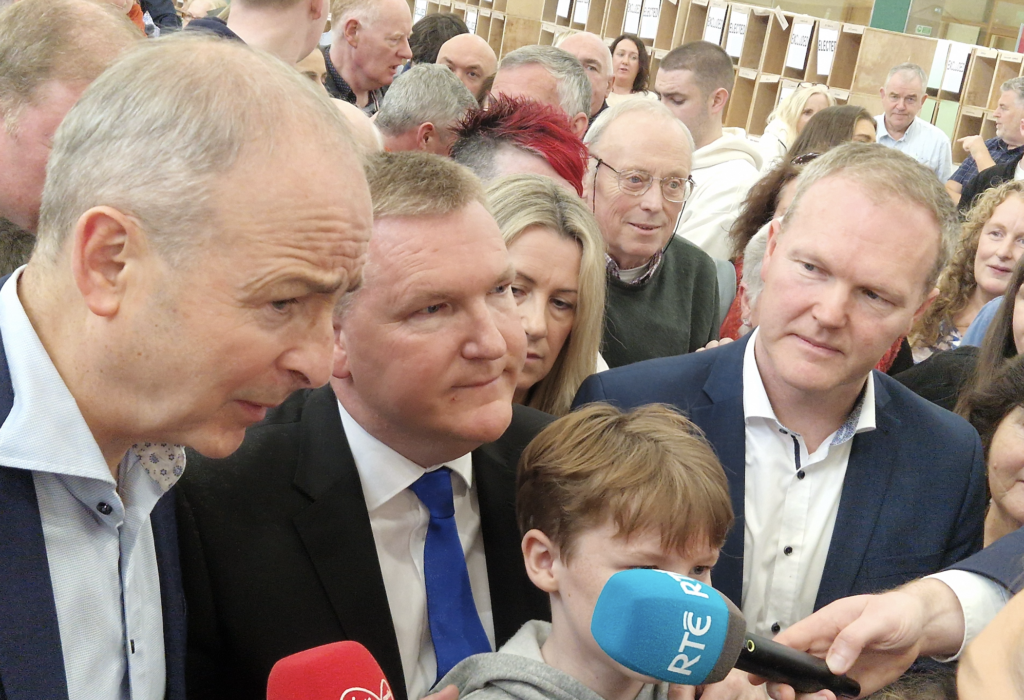THE donkey work is over, now the horse trading begins.
Ireland's general election 2024 managed to be both dramatic and stale, fascinating and mundane.
Cue the messy and protracted negotiations currently taking place in the aftermath to form a government by St Valentine's Day.
Or more likely by Donald Trump's Inauguration on January 20th.
Being up close and personal with key national players at Cork's election count centre offered me quite an insight.
Current Tánaiste, former - and now next - Taoiseach Micheál Martin appeared cautiously victorious.
He patiently awaited the national results with his Fianna Fáil foot soldiers. He had an air of vindication and relief, as rival parties' candidates looked on.
The Rebel City's other national figures, outgoing Finance Minister Michael McGrath and Fine Gael's Simon Coveney mingled effortlessly among election staff, canvassers and reporters also with a sense of quiet reassurance for their parties' fortunes.
 Micheál Martin, Seamus McGrath, Michael McGrath at the count in Cork (photo by Peter Kelly)
Micheál Martin, Seamus McGrath, Michael McGrath at the count in Cork (photo by Peter Kelly)The long expected 'Sinn Féin surge' did not materialise. From the party's highwater mark of 36% popularity in 2022, its leader Mary Lou McDonald has boisterously presented herself as Taoiseach in waiting.
Her party's confident stance on anti-poverty measures and particularly as champions of the housing crisis solution was seemingly neutered by a resurgent Fianna Fáil -Fine Gael counteraction.
The British Conservatives' past election slogan under Theresa May was 'Strong and Stable' and was widely ridiculed.
In Ireland, this approach seemed to work in the incumbent parties' favour, who promised more of the same.
Yet both incumbent parties of Fianna Fáil and Fine Gael fell two TDs short of the overall combined majority needed of 88 in the Dáil.
The fragmented nature of Irish politics means that the dubious dating game of coalition building and maintenance is built into elections and their aftermath.
With it comes temptation, thrills and dangers for smaller parties.
They often act as the 'mud-guard' on the wheels of larger government parties and then face the wrath of the electorate afterwards.
 Peter Kelly was in Cork for the election count
Peter Kelly was in Cork for the election countThe Green Party's decimation from 12 seats to a solo TD, in its leader- and only just, was a salutary reminder last week.
Now the two mainstream parties look around for likely coalition partners, perhaps with Irish Labour and the Social Democrats - the latter securing a certain 'novelty party' status.
However, Irish Labour will be painfully aware of their bruising experience of losing 30 TDs after their 2011 government partnership with Fine Gael.
Their subsequent decimation at the 2016 election should make Labour allergic to even the thought of contemplating the current coalition.
It is likely to be down to a marriage of convenience between Fianna Fáil, Fine Gael and a hotchpotch of Independents.
This disproportionate mix will be fascinating to see in its working out.
Hitherto nationally unknown names such as Verona Murphy, Michael Fitzmaurice, Michael Collins, Carol Nolan and Ken O'Flynn may secure unexpectedly exalted status.
They could join established independents such as Marian Harkin and Noel Grealish.
These probable and unlikely 'king makers' of Irish politics will want to exact a price from the finances of the state to ensure continued loyalty.
See the Healy-Rae fortunes for their constituency in Kerry for prior proof.
The adage that politics is the art of the possible is about to be played out.
But we are also reminded that a week is a long time in politics, and that any outcome is possible.
Electoral acrobatics is no doubt being performed behind the scenes in Dublin to shape government formation as we speak.
Like an electoral form of papal conclave, we await the white smoke and ultimate, final outcome of Election 2024.
Time will tell.

